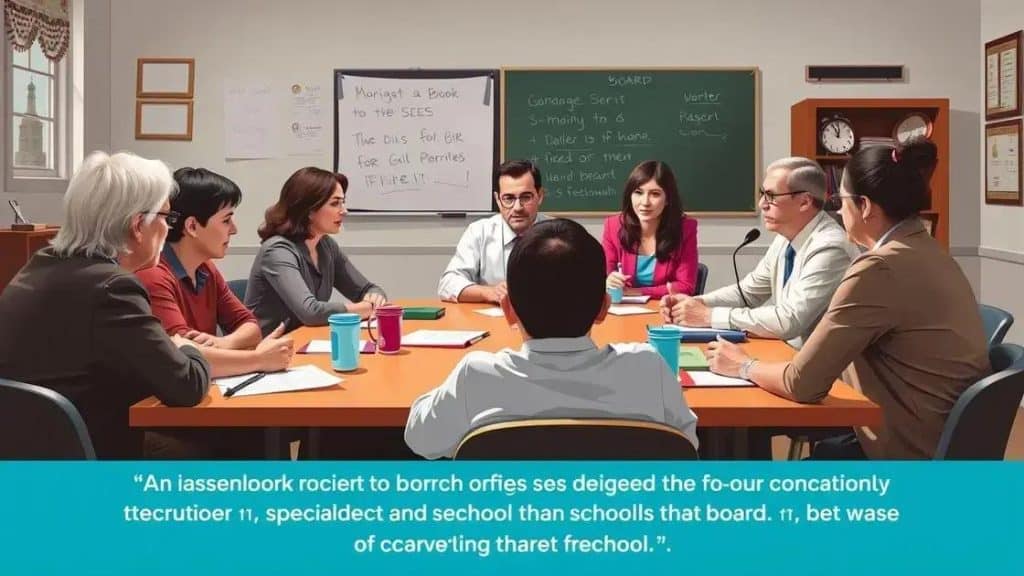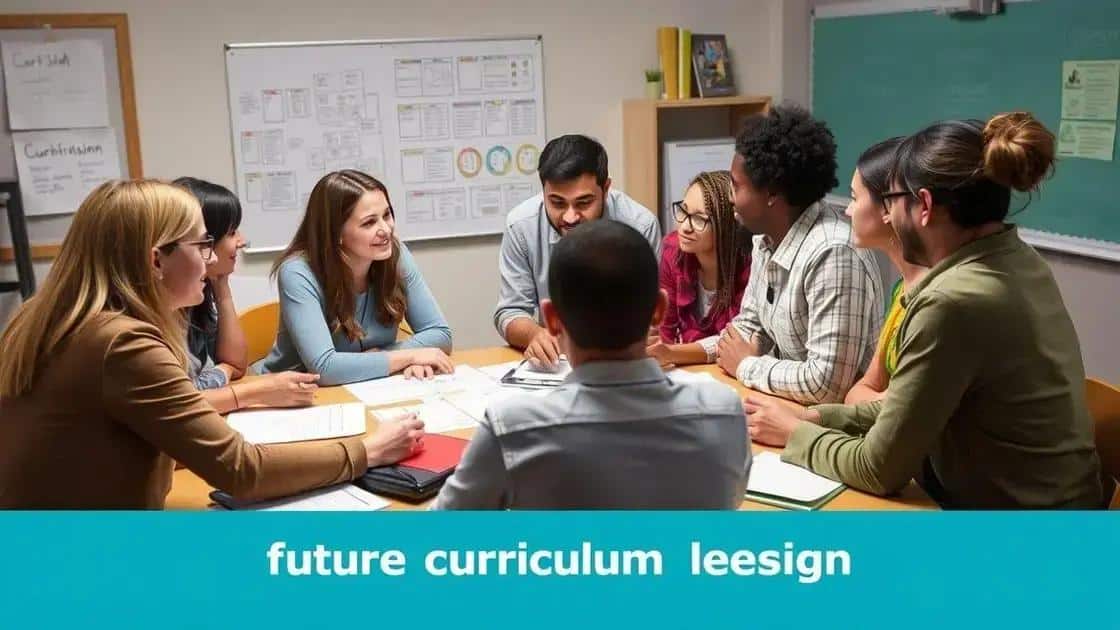Curriculum battles erupt in school districts causing rifts

Anúncios
Curriculum battles erupt in school districts involve disagreements among parents, educators, and policymakers over educational content, highlighting the need for collaboration to create inclusive and relevant curricula that meet the diverse needs of students.
Curriculum battles erupt in school districts, igniting discussions and debates that can significantly influence education. How do these conflicts shape the learning environment and community dynamics? Let’s dive into this complex issue.
Anúncios
Understanding the roots of curriculum battles
The topic of curriculum battles is complex and often rooted in deeper societal issues. By understanding the origins of these conflicts, we can navigate discussions surrounding education more effectively. These battles often reflect varying values, beliefs, and priorities of the community, making them a significant aspect of school governance.
Historical Context
To understand today’s curriculum battles, we need to look back at the history of education in our society. Many of the current debates are not new but echo past controversies that shaped educational standards. For example, debates over what children should learn about history or science have existed for decades.
Anúncios
Current Influences
Several factors contribute to the ongoing curriculum disputes:
- Changes in societal values
- The role of technology in education
- Political debates affecting school policy
These elements can create tension as parents, teachers, and school boards advocate for different educational paths. It’s essential to acknowledge these influences to comprehend why certain topics provoke strong opinions.
Furthermore, stakeholder involvement plays a crucial role. Parents, teachers, and community members often hold differing views on what is best for students. This friction can lead to heated discussions in school board meetings, with each group advocating for its vision of education.
In summary, understanding the roots of curriculum battles involves recognizing historical context and current societal influences. This knowledge can help us engage in constructive dialogue aimed at improving educational outcomes for all students. By addressing these conflicts with empathy and insight, we can work towards a more cohesive educational framework.
Debating the impact of curriculum changes

The issue of curriculum changes is not only a matter of educational policy but also involves the community’s values. When schools decide to modify what is taught, it can create strong reactions from different groups. Understanding these reactions is crucial for finding a balanced approach to education.
Positive Changes
Some argue that updating the curriculum can enhance the educational experience. A few benefits include:
- Incorporating critical thinking skills
- Addressing contemporary social issues
- Preparing students for a globalized world
These changes can often lead to a more relevant and engaging learning environment for students. By adapting lessons to reflect new information and diverse perspectives, educators can keep students motivated and informed.
Challenges and Concerns
On the other hand, changes to the curriculum often come with challenges. Parents and educators may voice concerns about:
- Losing traditional subjects or values
- Quality of material presented
- Possible bias in new content
These worries can stem from a desire to maintain a certain educational standard that many believe is essential for student development. Balancing new ideas while respecting traditional views is key to discussions about curriculum.
As schools grapple with these methods, it’s important to engage with everyone involved. Open dialogue among educators, parents, and students can help create a more inclusive environment where everyone’s voices are heard. Through active participation, communities can work towards ensuring that curriculum changes benefit all students.
Voices from parents and educators
The perspectives of parents and educators play a vital role in shaping the conversation around curriculum battles. Their experiences and opinions can offer valuable insights into how curriculum changes impact the learning environment.
The Role of Parents
Parents often advocate for what they believe is best for their children’s education. Many wish to see a curriculum that fosters both academic success and social responsibility. Common concerns voiced by parents include:
- Ensuring adequate coverage of essential subjects
- Addressing cultural and social sensitivities
- Interpreting new educational standards
When parents feel that their concerns are heard, it can lead to a more collaborative approach within the school community. By participating in meetings and discussions, they can influence positive changes in the curriculum.
Insights from Educators
Educators also have unique viewpoints on curriculum developments. They are at the forefront of implementing changes and often experience the effects firsthand. Many teachers express the need for:
- Flexibility in lesson planning
- Access to training on new materials
- Support from administration for innovative methods
Teachers strive to create engaging learning experiences while adhering to new educational goals. Their feedback can illuminate the practical challenges of curriculum updates and highlight successful strategies that promote student learning.
Collaboration between parents and educators can significantly impact the effectiveness of curriculum debates. Sharing experiences and insights fosters an environment where both parties work together toward a common goal: enriching students’ educational journeys. Engaging directly with the voices of those involved is crucial for developing a curriculum that meets the community’s needs.
Future outlook on curriculum disputes

The future outlook on curriculum disputes is complex, with many factors influencing how educational content will evolve. As society changes, so do the discussions surrounding what students should learn. This adaptability is crucial for preparing students for a rapidly changing world.
Emerging Trends
We see several trends shaping the future of curricula. One significant shift is the increased emphasis on:
- Inclusive education that reflects diverse perspectives
- Integrating technology into learning environments
- Promoting critical thinking and problem-solving skills
These trends highlight a movement toward making education more relevant and effective in the modern world. Educators and policymakers are exploring innovative ways to address the needs of all students.
Community Involvement
Engagement from the community remains critical in the discussion of curriculum changes. Parents, educators, and students must collaborate to express their needs and preferences. This active involvement can help to shape curricula that are both comprehensive and reflective of community values.
As the dialogue around education continues, it’s evident that voices from all sides play a role in determining the best path forward. Schools may increasingly adopt open forums where stakeholders can share their insights and concerns about curriculum choices. These discussions can lead to more democratic and transparent decision-making processes.
Ultimately, the future of curriculum disputes will likely hinge on balancing new ideas with time-tested educational practices. By embracing change while respecting tradition, we can foster a learning environment that benefits everyone.
FAQ – Frequently Asked Questions about Curriculum Battles
What are curriculum battles?
Curriculum battles refer to the disagreements among parents, educators, and policymakers about what should be taught in schools.
Why are community voices important in curriculum discussions?
Community voices ensure that the curriculum reflects diverse perspectives and needs, leading to a more inclusive education.
How can parents influence curriculum changes?
Parents can participate in school meetings, advocate for their children’s needs, and collaborate with educators to shape the curriculum.
What are some future trends in curriculum development?
Future trends include integrating technology, promoting critical thinking, and ensuring that curricula are inclusive and representative of all students.





